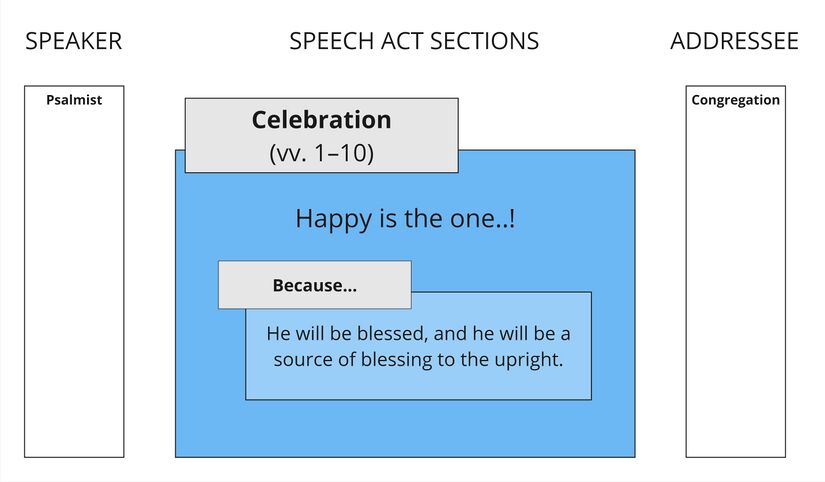Psalm 112 Speech Act
From Psalms: Layer by Layer
Psalm 112/Speech Act
Choose a PsalmNavigate Psalm 112
Speech Act Analysis
The Speech Act layer presents the text in terms of what it does, following the findings of Speech Act Theory. It builds on the recognition that there is more to communication than the exchange of propositions. Speech act analysis is particularly important when communicating cross-culturally, and lack of understanding can lead to serious misunderstandings, since the ways languages and cultures perform speech acts varies widely.
For a detailed explanation of our method, see the Speech Act Analysis Creator Guidelines.
Speech Act Analysis Chart
The following chart is scrollable (left/right; up/down).
| Verse | Hebrew | CBC | Sentence type | Illocution (general) | Illocution with context | Macro speech act | Intended perlocution (Think) | Intended perlocution (Feel) | Intended perlocution (Do) |
| Verse number and poetic line | Hebrew text | English translation | Declarative, Imperative, or Interrogative Indirect Speech Act: Mismatch between sentence type and illocution type |
Assertive, Directive, Expressive, Commissive, or Declaratory Indirect Speech Act: Mismatch between sentence type and illocution type |
More specific illocution type with paraphrased context | Illocutionary intent (i.e. communicative purpose) of larger sections of discourse These align with the "Speech Act Summary" headings |
What the speaker intends for the address to think | What the speaker intends for the address to feel | What the speaker intends for the address to do |
If an emendation or revocalization is preferred, that emendation or revocalization will be marked in the Hebrew text of all the visuals.
| Emendations/Revocalizations legend | |
|---|---|
| *Emended text* | Emended text, text in which the consonants differ from the consonants of the Masoretic text, is indicated by blue asterisks on either side of the emendation. |
| *Revocalized text* | Revocalized text, text in which only the vowels differ from the vowels of the Masoretic text, is indicated by purple asterisks on either side of the revocalization. |
| Verse | Text (Hebrew) | Text (CBC) | Sentence type | Illocution (general) | Illocution with context | Macro speech act | Intended perlocution (Think) | Intended perlocution (Feel) | Intended perlocution (Do) | Speech Act Notes | Unnamed: 12 | |
|---|---|---|---|---|---|---|---|---|---|---|---|---|
| 1a | הַ֥לְלוּ יָ֨הּ ׀ | Praise Yah! | Imperative | Expressive | Praising YHWH. | • See notes on Ps. 150:1. | • The Global Speech Act for the whole psalm is encapsulated in the very first words: אשרי איש (v. 1a). These words are echoed halfway through the psalm: טוב איש (v. 5a). In other words, the purpose of the psalm is to celebrate the man who fears YHWH. Everything outside of v. 1 and v. 5 is explaining why this person is to be celebrated. In v. 6, the speech-act כִּי makes this explanatory relationship explicit. In the other verses which do not (and, given the acrostic structure, cannot) begin with כִּי, this relationship is implicit. The prolonged explanation is itself, however, a form of celebration. II • In terms of the Intended Perlocution, if Psalm 112 is primarily about a king (see Exegetical Issue and Story Behind), and if the psalm was written at a time when there was no king (scholars generally agree that the psalm is post-exilic) then Psalm 112 would have inspired hope in its earliest hearers—hope in a king from David's line who would fear YHWH and keep his commands (cf. Pss. 1–2). II • In addition to inspiring hope, Psalm 112 would have inspired people to imitate the man who is here celebrated. | |||||
| 1b | אַשְׁרֵי־אִ֭ישׁ יָרֵ֣א אֶת־יְהוָ֑ה | Happy is the one [who] fears YHWH, | Fragment | Celebrating the one who fears YHWH who fears YHWH and delights in his commands. | Celebrating the one who fears YHWH | Celebrating the one who fears YHWH | Listeners will acknowledge the goodness of fearing YHWH and delighting in his commands. | • Listeners will reverently fear YHWH and delight in his commands. II • Listeners will hope in a future king who will exemplify the fear of YHWH. |
Listeners will worship YHWH and obey his commands. | • For אשיר איש, See notes on Ps. 1:1. | ||
| 1c | בְּ֝מִצְוֺתָ֗יו חָפֵ֥ץ מְאֹֽד׃ | [who] delights very much in his commands! | ||||||||||
| 2a | גִּבּ֣וֹר בָּ֭אָרֶץ יִהְיֶ֣ה זַרְע֑וֹ | His offspring will be great on the earth, | Declarative | Assertive | Explaining why the one who fears YHWH is to be celebrated. | Explaining why the one who fears YHWH is to be celebrated. | Listeners will understand the benefit of fearing YHWH. | |||||
| 2b | דּ֭וֹר יְשָׁרִ֣ים יְבֹרָֽךְ׃ | a generation of upright people [who] will be blessed. | ||||||||||
| 3a | הוֹן־וָעֹ֥שֶׁר בְּבֵית֑וֹ | Immense wealth is in his house, | ||||||||||
| 3b | וְ֝צִדְקָת֗וֹ עֹמֶ֥דֶת לָעַֽד׃ | and his righteousness endures forever. | ||||||||||
| 4a | זָ֘רַ֤ח בַּחֹ֣שֶׁךְ א֭וֹר לַיְשָׁרִ֑ים | A light for the upright has risen in the darkness, | Comparing the one who fears YHWH to a light and thus explaining why the one who fears YHWH is to be celebrated. | |||||||||
| 4b | חַנּ֖וּן וְרַח֣וּם וְצַדִּֽיק׃ | merciful and compassionate and righteous. | ||||||||||
| 5a | טֽוֹב־אִ֭ישׁ חוֹנֵ֣ן וּמַלְוֶ֑ה | Fortunate is the one who lends generously, | Celebrating the one who fears YHWH who lends generously and manages his affairs with justice. | Celebrating the one who fears YHWH | Listeners will acknowledge the goodness of fearing YHWH and delighting in his commands. | |||||||
| 5b | יְכַלְכֵּ֖ל דְּבָרָ֣יו בְּמִשְׁפָּֽט׃ | [who] manages his affairs with justice! | ||||||||||
| 6a | כִּֽי־לְעוֹלָ֥ם לֹא־יִמּ֑וֹט | For he will never waver. | Explaining why the one who fears YHWH is to be celebrated (כִּי grounding the speech act of v. 5). | Explaining why the one who fears YHWH is to be celebrated. | Listeners will understand the benefit of fearing YHWH. | |||||||
| 6b | לְזֵ֥כֶר ע֝וֹלָ֗ם יִהְיֶ֥ה צַדִּֽיק׃ | The righteous one will be remembered forever. | ||||||||||
| 7a | מִשְּׁמוּעָ֣ה רָ֭עָה לֹ֣א יִירָ֑א | He will not be afraid of bad news. | Explaining why the one who fears YHWH is to be celebrated. | |||||||||
| 7b | נָכ֥וֹן לִ֝בּ֗וֹ בָּטֻ֥חַ בַּיהוָֽה׃ | His heart is confident, trusting in YHWH. | ||||||||||
| 8a | סָמ֣וּךְ לִ֭בּוֹ לֹ֣א יִירָ֑א | His heart is encouraged. He will not be afraid, | ||||||||||
| 8b | עַ֖ד אֲשֶׁר־יִרְאֶ֣ה בְצָרָֽיו׃ | until he looks [in triumph] on his adversaries. | ||||||||||
| 9a | פִּזַּ֤ר ׀ נָ֘תַ֤ן לָאֶבְיוֹנִ֗ים | He has given freely to the poor. | ||||||||||
| 9b | צִ֭דְקָתוֹ עֹמֶ֣דֶת לָעַ֑ד | His righteousness endures forever. | ||||||||||
| 9c | קַ֝רְנ֗וֹ תָּר֥וּם בְּכָבֽוֹד׃ | His horn will rise in honor. | ||||||||||
| 10a | רָ֘שָׁ֤ע יִרְאֶ֨ה ׀ וְכָעָ֗ס | The wicked person will see and become vexed. | Explaining why the one who fears YHWH is to be celebrated (i.e., because under his reign the wicked will be stopped). | |||||||||
| 10b | שִׁנָּ֣יו יַחֲרֹ֣ק וְנָמָ֑ס | He will grind his teeth and waste away. | Explaining why the one who fears YHWH is to be celebrated. | |||||||||
| 10c | תַּאֲוַ֖ת רְשָׁעִ֣ים תֹּאבֵֽד׃ | The desire of the wicked will come to an end. | ||||||||||


